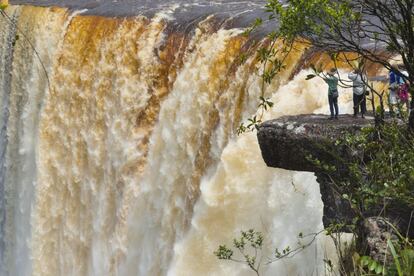Where is the next big boom going to be?
It’s probably the last place you’d expect

Which economy will grow fastest in the next few years? Try to guess. Perhaps you are thinking of Vietnam, which has been steadily taking market share from China, which has hamstrung itself through its Draconian zero-Covid policy. Or the African champion of growth, Rwanda, whose economy has quintupled since 1995. Or Bangladesh, whose export sector is the catalyst for Asia’s biggest boom.
The answer is none of those. The world champion in economic growth in the coming years will be Guyana. That’s right. The miniscule, seldom-heard-of strip of tropical forest on South America’s northern coast is in the midst of a giant oil boom.
Since 2015, Guyana has led the world in offshore oil discoveries, with 11.2 billion new barrels discovered, almost a third of all new oil discoveries worldwide in that period. Researchers at Nexus Group, a consulting firm, expect the country to become one of the world’s top five offshore oil producers within a few years, ahead of oil giants like the United States, Mexico and Norway.
By the middle of the next decade, Guyana is expected to produce more oil per capita than any other country. Just the government’s oil revenue could top $21,000 per capita, nearly double today’s total GDP per person.
This year, the Guyanese economy could grow 58%, an unheard-of figure. Oil sector GDP-growth could average 30% a year between 2023 and 2026. What has historically been one of the poorest countries in the Americas has already surpassed the world average per capita income, and the boom is just getting going.
But while this is good news for Guyana, is it bad news for the environment? Not necessarily. Guyana’s oil emissions intensity – that is, the amount of carbon released per barrel produced – is only half the world’s average, and it continues to fall. If Guyanese oil displaces its dirtier competitors, Guyana’s oil boom could actually drive down carbon emissions.
Another area of concern is the boom’s socioeconomic impact. Will the bonanza really help the Guyanese people? The country is getting richer, certainly, but many of its inhabitants remain poor. It ranks a lowly 108th out of 191 countries on the UN’s Human Development Index. The Economist Intelligence Unit classifies it as a “flawed democracy”: elections are competitive but not always fair. A disputed election result in 2020 gave rise to a bitter brawl that lasted for months and triggered several waves of violence between the supporters of the contending candidates.
Ethnic tension has long defined politics in a country divided by the legacy of the British empire: 40% of Guyanese trace their ancestry to India, 30% to Africa, while 10% are indigenous and the remaining 20% are mixed. Guyanese voters tend to vote by ethnic bloc, a practice that rarely goes hand in hand with political stability. And corruption, unfortunately, is deeply entrenched.
For decades, we have seen how oil booms almost always end in tears. Rival groups fight fiercely for control of oil revenues instead of working together for a better future for all. The phenomenon is so common that it has its own name: the resource curse. Given its ethnic divisions and history of corruption, Guyana has already ticked off two risk factors for the resource curse. Will the Guyanese be able to break the cycle?
They might because they also have a couple of trump cards up their sleeves. Flawed as it may be, Guyana’s is still a democracy, and this helps inoculate countries against the resource curse. And the sheer size of this oil boom, coupled with Guyana’s tiny population, might make it possible to satisfy everyone’s aspirations without having to get embroiled in the impoverishing cycles that come when rival groups are scrambling for their share of the oil loot.
Without wise and prudent political leadership, oil wealth can easily become a curse. Will the leaders of Guyana heed the lessons of other countries? The world will be watching.
Tu suscripción se está usando en otro dispositivo
¿Quieres añadir otro usuario a tu suscripción?
Si continúas leyendo en este dispositivo, no se podrá leer en el otro.
FlechaTu suscripción se está usando en otro dispositivo y solo puedes acceder a EL PAÍS desde un dispositivo a la vez.
Si quieres compartir tu cuenta, cambia tu suscripción a la modalidad Premium, así podrás añadir otro usuario. Cada uno accederá con su propia cuenta de email, lo que os permitirá personalizar vuestra experiencia en EL PAÍS.
¿Tienes una suscripción de empresa? Accede aquí para contratar más cuentas.
En el caso de no saber quién está usando tu cuenta, te recomendamos cambiar tu contraseña aquí.
Si decides continuar compartiendo tu cuenta, este mensaje se mostrará en tu dispositivo y en el de la otra persona que está usando tu cuenta de forma indefinida, afectando a tu experiencia de lectura. Puedes consultar aquí los términos y condiciones de la suscripción digital.









































